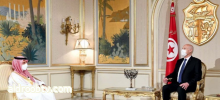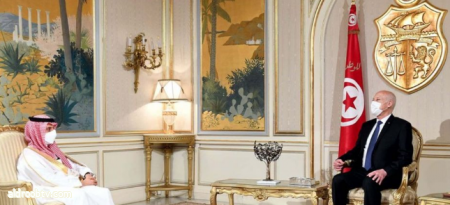sonda belhedi ///What is the truth about what is said about an Emirate role in what Tunisia is witnessing?

[LEF
the "coup" of President Qais Saeed against the constitution
The Times quoted Ghannouchi as saying that Abu Dhabi is determined to end the Arab Spring, which began in Tunisia in 2011 and overthrew the rule of the late dictator Zine El Abidine Ben Ali, as he said, adding, "The Islamic democratic Emirates considered a threat to his authority, and took it upon themselves to make the idea of spring die." The Arab that started in Tunisia just as it started from it.
The Ennahda leader added, "Military control of power, similar to what happened in Egypt, will not be possible in Tunisia, because Tunisia is not Egypt, and there are different relations between the army and the government, and the army has protected freedom and ballot boxes since the revolution." He also addressed the UAE's concerns about developments in Libya. He said that they fear a peaceful settlement there, adding, "They are afraid of democratic transitions and the possibility of their spreading to the rest of the Arab region."
The Emirati response to Ghannouchi's statements came from Anwar Gargash
Diplomatic Adviser to the President of the Emirates, who said on Twitter that the leader of the "Ennahda Movement" in Tunisia, Rashid Ghannouchi, had brought the name of the Emirates to justify his failure, and demanded that he look at the events of his country from an internal perspective.
Gargash wrote in a tweet to him on his Twitter account on Saturday, July 31,
T]The Tunisian President receives the Saudi Foreign Minister, Friday, July 30th
Since Tunisian President Kais Saied made his recent decisions to freeze parliament, dismiss the government, and assume the position of attorney general on Sunday 25 July, and the subsequent arrests of political figures, the voices of Tunisians on social media have not stopped, nor have the voices of activists. Politicians, talking about the involvement of the United Arab Emirates in the events witnessed by Tunisia
As for the latest statement issued in this regard, accusing the UAE of being behind what Tunisia witnessed, it came from a Tunisian political tycoon, and a party to the political game is Rashid Ghannouchi, Speaker of Parliament and leader of the Ennahda movement, who directed in an interview with the British newspaper (The Times), The accusing finger of the United Arab Emirates, stressing that it is behind Since Tunisian President Kais Saied made his recent decisions to freeze parliament, dismiss the government, and assume the position of attorney general on Sunday 25 July, and the subsequent arrests of political figures, the voices of Tunisians on social media have not stopped, nor have the voices of activists. Politicians, talking about the involvement of the United Arab Emirates in the events witnessed by Tunisia
the "coup" of President Qais Saeed against the constitution
The Times quoted Ghannouchi as saying that Abu Dhabi is determined to end the Arab Spring, which began in Tunisia in 2011 and overthrew the rule of the late dictator Zine El Abidine Ben Ali, as he said, adding, "The Islamic democratic Emirates considered a threat to his authority, and took it upon themselves to make the idea of spring die." The Arab that started in Tunisia just as it started from it.
The Ennahda leader added, "Military control of power, similar to what happened in Egypt, will not be possible in Tunisia, because Tunisia is not Egypt, and there are different relations between the army and the government, and the army has protected freedom and ballot boxes since the revolution." He also addressed the UAE's concerns about developments in Libya. He said that they fear a peaceful settlement there, adding, "They are afraid of democratic transitions and the possibility of their spreading to the rest of the Arab region."
The Emirati response to Ghannouchi's statements came from Anwar Gargash
Diplomatic Adviser to the President of the Emirates, who said on Twitter that the leader of the "Ennahda Movement" in Tunisia, Rashid Ghannouchi, had brought the name of the Emirates to justify his failure, and demanded that he look at the events of his country from an internal perspective.
Gargash wrote in a tweet to him on his Twitter account on Saturday, July 31,
saying: "I was not surprised by Mr. Rashid Ghannouchi's dialogue with the London Times newspaper, and his accusations against the UAE. He added, "My advice is to have an internal reading of his country's events, which will certainly be more accurate and perhaps more beneficial."
Away from the politicians’ talk, Tunisians and non-Tunisians from the Arab region are active on social media, especially Twitter, in talking about the Emirati role, among large groups that see the UAE as the one behind what Tunisia witnessed and through the hashtag “# UAE is the source of evil” and “Boycott.” The Emirates”, while others believe that what Tunisia witnessed was due to the deterioration of the situation internally, and the corruption of parties, and there

[/LEFT]Away from the politicians’ talk, Tunisians and non-Tunisians from the Arab region are active on social media, especially Twitter, in talking about the Emirati role, among large groups that see the UAE as the one behind what Tunisia witnessed and through the hashtag “# UAE is the source of evil” and “Boycott.” The Emirates”, while others believe that what Tunisia witnessed was due to the deterioration of the situation internally, and the corruption of parties, and there
was no external role
Why do some neglect the role of the deteriorating economic and living situation inside Tunisia in what happene

